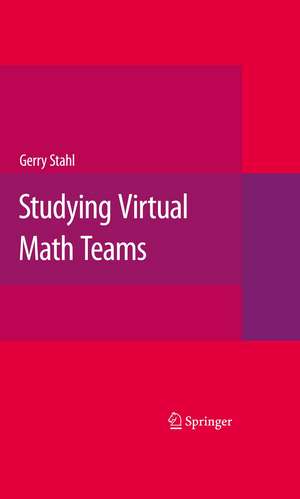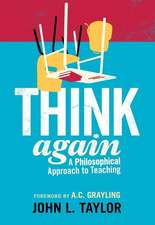Studying Virtual Math Teams: Computer-Supported Collaborative Learning Series, cartea 11
Editat de Gerry Stahlen Limba Engleză Paperback – 17 sep 2010
This book presents a coherent research agenda that has been pursued by the author and his research group. The book opens with descriptions of the project and its methodology, as well as situating this research in the past and present context of the CSCL research field. The core research team then presents five concrete analyses of group interactions in different phases of the Virtual Math Teams research project. These chapters are followed by several studies by international collaborators, discussing the group discourse, the software affordances and alternative representations of the interaction, all using data from the VMT project. The concluding chapters address implications for the theory of group cognition and for the methodology of the learning sciences. In addition to substantial introductory and concluding chapters, this important new book includes analyses based upon the author's previous research, thereby providing smooth continuity and an engaging flow that follows the progression of the research.
The VMT project has dual goals: (a) to provide a source of experience and data for practical and theoretical explorations of group knowledge building and (b) to develop an effective online environment and educational service for collaborative learning of mathematics. Studying Virtual Math Teams reflects these twin orientations, reviewing the intertwined aims and development of a rigorous science of small-group cognition and a Web 2.0 educational math service. It documents the kinds of interactional methods that small groups use to explore math issues and provides a glimpse into the potential of online interaction to promote productive math discourse.
| Toate formatele și edițiile | Preț | Express |
|---|---|---|
| Paperback (1) | 1832.53 lei 6-8 săpt. | |
| Springer Us – 17 sep 2010 | 1832.53 lei 6-8 săpt. | |
| Hardback (1) | 1838.87 lei 6-8 săpt. | |
| Springer Us – 17 sep 2009 | 1838.87 lei 6-8 săpt. |
Din seria Computer-Supported Collaborative Learning Series
- 15%
 Preț: 659.53 lei
Preț: 659.53 lei - 15%
 Preț: 648.42 lei
Preț: 648.42 lei -
 Preț: 387.38 lei
Preț: 387.38 lei - 18%
 Preț: 951.29 lei
Preț: 951.29 lei - 15%
 Preț: 642.83 lei
Preț: 642.83 lei - 18%
 Preț: 1135.35 lei
Preț: 1135.35 lei - 18%
 Preț: 949.55 lei
Preț: 949.55 lei - 18%
 Preț: 1021.68 lei
Preț: 1021.68 lei - 18%
 Preț: 1398.94 lei
Preț: 1398.94 lei - 18%
 Preț: 1241.25 lei
Preț: 1241.25 lei - 15%
 Preț: 639.73 lei
Preț: 639.73 lei - 15%
 Preț: 645.28 lei
Preț: 645.28 lei - 18%
 Preț: 953.20 lei
Preț: 953.20 lei - 18%
 Preț: 955.25 lei
Preț: 955.25 lei - 18%
 Preț: 1116.09 lei
Preț: 1116.09 lei - 15%
 Preț: 646.11 lei
Preț: 646.11 lei - 15%
 Preț: 641.03 lei
Preț: 641.03 lei
Preț: 1832.53 lei
Preț vechi: 2234.80 lei
-18% Nou
Puncte Express: 2749
Preț estimativ în valută:
350.65€ • 367.09$ • 290.14£
350.65€ • 367.09$ • 290.14£
Carte tipărită la comandă
Livrare economică 05-19 aprilie
Preluare comenzi: 021 569.72.76
Specificații
ISBN-13: 9781441956774
ISBN-10: 1441956778
Pagini: 626
Ilustrații: XXII, 626 p. 40 illus.
Dimensiuni: 156 x 234 x 33 mm
Greutate: 0.9 kg
Ediția:2009
Editura: Springer Us
Colecția Springer
Seria Computer-Supported Collaborative Learning Series
Locul publicării:New York, NY, United States
ISBN-10: 1441956778
Pagini: 626
Ilustrații: XXII, 626 p. 40 illus.
Dimensiuni: 156 x 234 x 33 mm
Greutate: 0.9 kg
Ediția:2009
Editura: Springer Us
Colecția Springer
Seria Computer-Supported Collaborative Learning Series
Locul publicării:New York, NY, United States
Public țintă
ResearchCuprins
Introducing Group Cognition in Virtual Math Teams.- A Chat About Chat.- The VMT Vision.- Mathematical Discourse as Group Cognition.- Interactional Methods and Social Practices in VMT.- From Individual Representations to Group Cognition.- Studying Group Cognition in Virtual Math Teams.- The Sequential Co-Construction of the Joint Problem Space.- The Organization of Graphical, Narrative and Symbolic Interactions.- Question Co-Construction in VMT Chats.- Resolving Differences of Perspective in a VMT Session.- Studying Group Discourse in Virtual Math Teams.- Representational Practices in VMT.- Student and Team Agency in VMT.- Group Creativity in VMT.- Inscriptions, Mathematical Ideas and Reasoning in VMT.- Reading’s Work in VMT.- Designing the VMT Collaboration Environment.- The Integration of Dual-Interaction Spaces.- Designing a Mix of Synchronous and Asynchronous Media for VMT.- Deictic Referencing in VMT.- Scripting Group Processes in VMT.- Helping Agents in VMT.- Representing Group Interaction in VMT.- Thread-Based Analysis of Patterns in VMT.- Studying Response-Structure Confusion in VMT.- A Multidimensional Coding Scheme for VMT.- Combining Coding and Conversation Analysis of VMT Chats.- Polyphonic Inter-Animation of Voices in VMT.- A Model for Analyzing Math Knowledge Building in VMT.- Conceptualizing Group Cognition in VMT.- Meaning Making in VMT.- Critical Ethnography in the VMT Project.- Toward a Science of Group Cognition.
Recenzii
From the reviews:
“This is an excellent book … . In 2002, a group of researchers began the Virtual Math Team Project, which is still active during 2009. The goal of the project is to provide a new opportunity for students to engage in mathematical discourse. … The book provides thoughts for explorations of group knowledge building and presents an effective online environment and educational service for collaborative learning of mathematics. … book will be matter of interest to researchers and practitioners within the mathematics education field.” (Valentina Dagienë, Zentralblatt MATH, Vol. 1178, 2010)
“This is an excellent book … . In 2002, a group of researchers began the Virtual Math Team Project, which is still active during 2009. The goal of the project is to provide a new opportunity for students to engage in mathematical discourse. … The book provides thoughts for explorations of group knowledge building and presents an effective online environment and educational service for collaborative learning of mathematics. … book will be matter of interest to researchers and practitioners within the mathematics education field.” (Valentina Dagienë, Zentralblatt MATH, Vol. 1178, 2010)
Notă biografică
Gerry Stahl teaches, publishes and conducts research in human-computer interaction (HCI) and computer-supported collaborative learning (CSCL). His recent book, Group Cognition: Computer Support for Building Collaborative Knowledge was published by MIT Press. He is founding Executive Editor of the International Journal of Computer-Supported Collaborative Learning (ijCSCL), published by Springer. He has contributed chapters to two edited volumes of the Springer CSCL series. He is the Principal Investigator of the Virtual Math Teams Project, a large 5-year research effort in collaboration with the Math Forum @ Drexel. He served as Program Chair for the international CSCL ’02 conference, Workshops Chair for CSCL ’03, CSCL ’05, ICCE ’06 and CSCL’07. He teaches undergraduate, masters and PhD courses in HCI, CSCW and CSCL at the I-School of Drexel University in Philadelphia. See CV for more details, at: http://www.cis.drexel.edu/faculty/gerry/resume.html.
Textul de pe ultima copertă
Studying Virtual Math Teams centers on detailed empirical studies of how students in small online groups make sense of math issues and how they solve problems by making meaning together. These studies are woven together with materials that describe the online environment and pedagogical orientation, as well as reflections on the theoretical implications of the findings in the studies. The nature of group cognition and shared meaning making in collaborative learning is a foundational research issue in CSCL. More generally, the theme of sense making is a central topic in information science. While many authors allude to these topics, few have provided this kind of detailed analysis of the mechanisms of intersubjective meaning making.
This book presents a coherent research agenda that has been pursued by the author and his research group. The book opens with descriptions of the project and its methodology, as well as situating this research in the past and present context of the CSCL research field. The core research team then presents five concrete analyses of group interactions in different phases of the Virtual Math Teams research project. These chapters are followed by several studies by international collaborators, discussing the group discourse, the software affordances and alternative representations of the interaction, all using data from the VMT project. The concluding chapters address implications for the theory of group cognition and for the methodology of the learning sciences. In addition to substantial introductory and concluding chapters, this important new book includes analyses based upon the author's previous research, thereby providing smooth continuity and an engaging flow that follows the progression of the research.
The VMT project has dual goals: (a) to provide a source of experience and data for practical and theoretical explorations of group knowledge building and (b) to develop an effective online environment and educational service for collaborative learning of mathematics. Studying Virtual Math Teams reflects these twin orientations, reviewing the intertwined aims and development of a rigorous science of small-group cognition and a Web 2.0 educational math service. It documents the kinds of interactional methods that small groups use to explore math issues and provides a glimpse into the potential of online interaction to promote productive math discourse.
This book presents a coherent research agenda that has been pursued by the author and his research group. The book opens with descriptions of the project and its methodology, as well as situating this research in the past and present context of the CSCL research field. The core research team then presents five concrete analyses of group interactions in different phases of the Virtual Math Teams research project. These chapters are followed by several studies by international collaborators, discussing the group discourse, the software affordances and alternative representations of the interaction, all using data from the VMT project. The concluding chapters address implications for the theory of group cognition and for the methodology of the learning sciences. In addition to substantial introductory and concluding chapters, this important new book includes analyses based upon the author's previous research, thereby providing smooth continuity and an engaging flow that follows the progression of the research.
The VMT project has dual goals: (a) to provide a source of experience and data for practical and theoretical explorations of group knowledge building and (b) to develop an effective online environment and educational service for collaborative learning of mathematics. Studying Virtual Math Teams reflects these twin orientations, reviewing the intertwined aims and development of a rigorous science of small-group cognition and a Web 2.0 educational math service. It documents the kinds of interactional methods that small groups use to explore math issues and provides a glimpse into the potential of online interaction to promote productive math discourse.
Caracteristici
Offers comprehensive theoretical framework of CSCL field Offers an extended research agenda Brings together previously fragmented literature Includes supplementary material: sn.pub/extras







